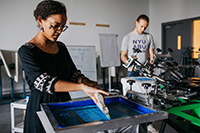-
Academics
-
Admissions
 Your journey to NYUAD starts here. Attend an application workshop or information session.Admissions Events
Your journey to NYUAD starts here. Attend an application workshop or information session.Admissions Events -
Research
-
Campus Life
 Live the possibilities. Be part of a dynamic community of students from over 115 countries.Take a Tour
Live the possibilities. Be part of a dynamic community of students from over 115 countries.Take a Tour - Public Programs
-
About
Exceptional education. World class research. Community-driven.Our Story
- News
- Events
- Social Media Directory
- Press Room
-
- Torch at NYUAD
- Faculty
- Current Students
- Alumni
- عربي
Wael Said Abdrabou
PhD Candidate in Biology
Affiliation: NYU Abu Dhabi
Education: BS University of Massachusetts; MS Northeastern University
Research Areas: Multi-omics Integrative Analysis, Metabolomics, Transcriptomics, Genomics, Malaria, Immune System
Wael Abdrabou has earned his BS degree in Biology from the University of Massachusetts. After graduating, he joined Massachusetts Eye and Ear Infirmary in Boston where he participated in various GWAS studies that aimed to identify genes and genetic variants associated with Glaucoma. In 2014, Wael earned his MS degree in Biotechnology from Northeastern University and joined Sanofi, Inc. Cambridge, the USA as an intern. At Sanofi, he worked on differential gene expression studies that aimed to identify target genes for vaccine development against infectious bacterial strains. During his internship, he developed a great experience with Next Generation Sequencing (NGS) techniques and platforms.
Currently, Wael is a PhD candidate at New York University Abu Dhabi (NYUAD) where he is pursuing his dissertation research investigating the dynamics that underlie the variation in human response to malaria infection among children. Through the collaboration between Idaghdour Lab at NYUAD and the national research center for Malaria in Burkina Faso (CRNFP), he is conducting a comparative analysis of the metabolome, genome, and transcriptome of three different pediatric cohorts from three ethnic groups in endemic regions of sub-Saharan Africa. He is utilizing an integrative multi-omics approach to describe metabolic perturbations and associated genetic variants and transcriptional events during infection. This approach can help identify biomarkers and biochemical and genetic pathways that can be targeted in future antimalarial treatments. It can also provide a more holistic and systemic view that is closer to reality on biochemical-gene networks associated with the infection.
Research
Wael is current using an integrative multi-omics approach to describe metabolic perturbations and associated genetic variants during malaria infection in children ages 2-10 years in endemic regions of sub-Saharan Africa.
